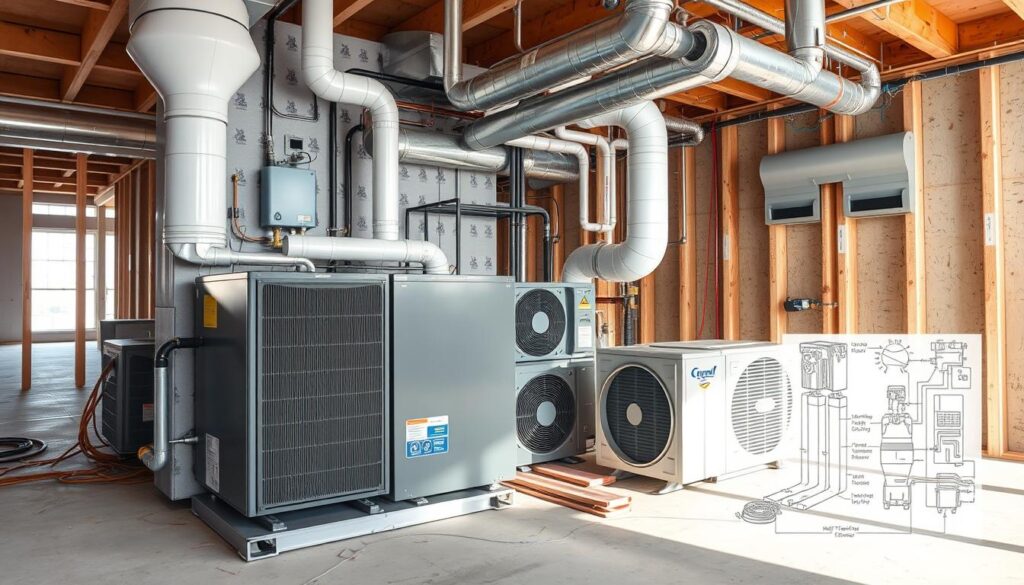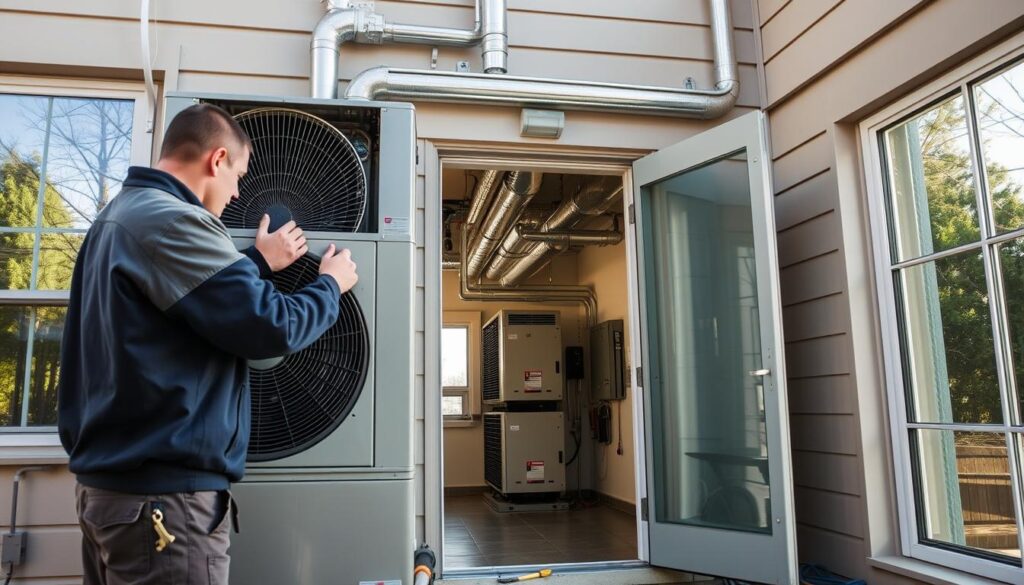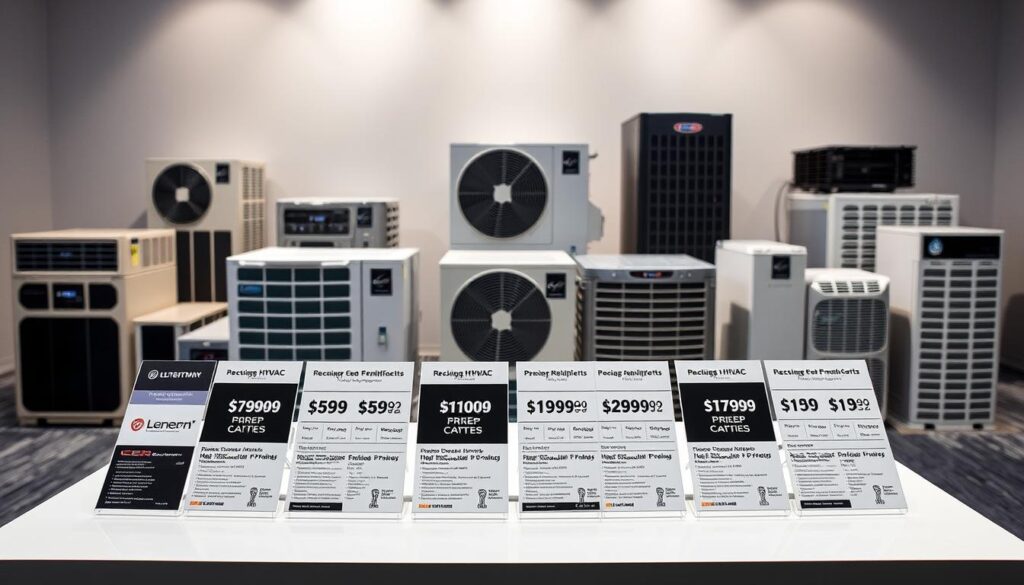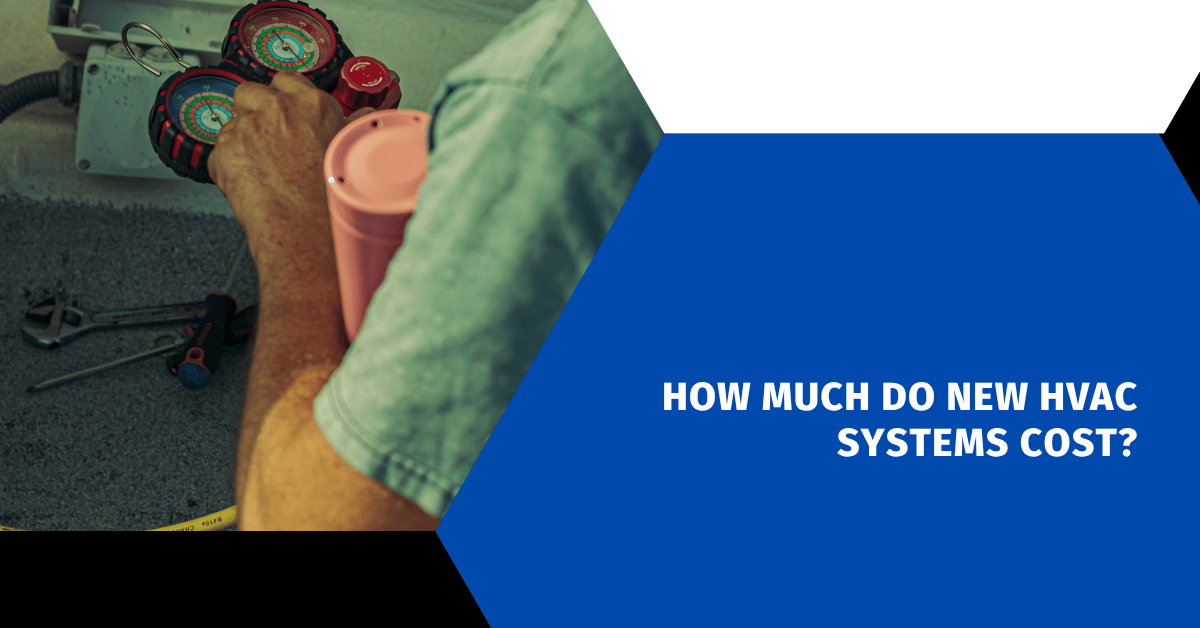Affiliate Disclosure
HVAC Guide Guys is a participant in the Amazon Services LLC Associates Program, an affiliate advertising program designed to provide a means for sites to earn advertising fees by advertising and linking to Amazon.
How Much Do New HVAC Systems Cost? Are you curious about the cost of a new HVAC system for your home? Figuring out hvac installation costs can seem overwhelming. It’s like trying to solve a puzzle with many pieces.

Homeowners often find the prices for new HVAC systems surprising. Angi’s recent data shows the average cost for a full HVAC system is about $7,500. Prices usually fall between $5,000 and $12,500.
The cost of your new HVAC system depends on several things. These include your home’s size, how complex the system is, and how energy-efficient it needs to be. This guide will help you understand what to expect when investing in a new heating and cooling system.
Key Takeaways
- Average HVAC system cost ranges from $5,000 to $12,500
- Total price depends on home size and system complexity
- Energy efficiency can impact initial investment
- Professional installation is key for best performance
- There are many financing options for homeowners
Table of Contents
Understanding HVAC System Basics
HVAC systems keep indoor spaces comfortable in homes and businesses. Knowing how they work helps you understand prices for residential and commercial systems.
Core Components of an HVAC System
An HVAC system has several important parts. They work together to control temperature and air quality:
- Heating unit (furnace or heat pump)
- Cooling unit (air conditioner)
- Ventilation system
- Thermostat and control mechanisms
- Ductwork for air distribution
Varieties of HVAC Systems
There are different HVAC systems for various needs:
| System Type | Best For | Typical Application |
|---|---|---|
| Split System | Residential homes | Individual room temperature control |
| Packaged Unit | Commercial buildings | Compact spaces with limited installation area |
| Ductless Mini-Split | Retrofitted spaces | Areas without existing ductwork |
Equipment Lifespan Considerations
Your HVAC system’s life depends on care and use. Most systems last between 10 to 15 years. Some may last up to 20 years with good care. Regular checks by pros can make your system last longer and save you money.
Proactive maintenance is key to maximizing your HVAC system’s performance and efficiency.
Average HVAC System Costs in 2025
Planning for HVAC replacement costs in 2025 is a big deal for homeowners. The price for a new HVAC system can vary a lot. You might spend between $5,000 and $11,000 for a full system change.
When looking at ac unit prices, several things affect the cost. The size of your home, the type of system, and how energy-efficient it is all matter. These factors help decide the final price.
- Basic system replacement: $5,000 – $7,500
- Mid-range system installation: $7,500 – $9,500
- High-end system replacement: $9,500 – $11,000
Your specific HVAC replacement costs can change based on a few key things:
| Factor | Price Impact |
|---|---|
| Home Square Footage | Direct correlation to system size |
| Energy Efficiency Rating | Higher SEER ratings increase initial cost |
| System Complexity | More advanced systems cost more |
Pro tip: Always get multiple quotes and consider long-term energy savings when evaluating ac unit prices for your home.
Explore Our HVAC Shop
Looking for top-rated HVAC tools, parts, and accessories? Visit our shop and find the perfect solution for your needs.
Visit the ShopHow Much Do New HVAC Systems Cost: A Complete Breakdown
Understanding hvac installation costs can feel overwhelming. But breaking down the expenses helps you make informed decisions about your home’s comfort system. The total price of a new HVAC system involves multiple factors that impact your overall investment.
When considering furnace prices and overall HVAC system expenses, you’ll encounter several key pricing tiers. These tiers determine your total investment:
- Basic system installations
- Mid-range system options
- Premium high-efficiency systems
Basic Installation Costs
Entry-level HVAC systems typically range from $3,000 to $5,000. These systems provide standard functionality without advanced features. Your home’s size and existing infrastructure will significantly influence the hvac installation costs.
Premium System Investments
High-end HVAC systems can reach $10,000 to $15,000. These premium options offer superior energy efficiency, advanced temperature control, and longer equipment lifespans. Furnace prices for top-tier models reflect their enhanced performance and technological capabilities.
Labor and Installation Fees
Installation expenses represent a substantial portion of your total HVAC investment. Professionals typically charge between 40-50% of the total project cost for labor. Factors affecting these fees include:
- Complexity of installation
- Home layout and accessibility
- Ductwork modifications
- Local labor rates
Tip: Always get multiple quotes to understand the full range of hvac installation costs in your area.
Your specific expenses will vary based on system type, home size, and local market conditions. Investing time in research can help you find the most cost-effective solution for your home’s heating and cooling needs.
Air Conditioning Unit Pricing Guide
Understanding ac unit prices is key to making a smart choice for your home. Different air conditioning systems have various prices and features. They cater to different cooling needs.
When looking at air conditioning options, you’ll find several main types:
- Window Units: Budget-friendly cooling solutions
- Portable AC Systems: Flexible and convenient
- Ductless Mini-Split Systems: Efficient zone cooling
- Central Air Conditioning: Whole-home temperature control
Your choice depends on several key factors:
- Room size and cooling requirements
- Energy efficiency ratings
- Installation complexity
- Budget constraints
Residential hvac pricing varies a lot. Window units start around $150. Central air conditioning systems can cost between $1,900 and $5,500. Ductless mini-split systems, with advanced technology, range from $2,000 to $14,500.
When picking an AC unit, think about long-term energy savings too. High-efficiency models might cost more at first. But they can cut your monthly utility bills a lot.
Furnace Installation Cost Analysis
When planning your HVAC replacement costs, it’s key to understand furnace prices. Different furnaces have unique benefits and prices. These can greatly affect your home heating plan.
Choosing the right furnace depends on several things. These include your home’s size, energy needs, and your budget. Let’s look at the three main furnace types and their costs.
Gas Furnace Investment
Gas furnaces are a common choice for many homeowners. Their cost to install is between $3,800 and $10,000. This price varies based on several factors:
- BTU capacity
- Energy efficiency rating
- Brand reputation
- Complexity of installation
Electric Furnace Options
Electric furnaces are another heating option. They cost between $1,600 and $6,900. This makes them a more affordable choice upfront.
| Furnace Type | Cost Range | Average Efficiency |
|---|---|---|
| Gas Furnace | $3,800 – $10,000 | 80-98% |
| Electric Furnace | $1,600 – $6,900 | 95-100% |
| Oil Furnace | $6,750 – $10,000 | 80-90% |
Oil Furnace Considerations
Oil furnaces are the most expensive, costing $6,750 to $10,000 to install. These systems are less common but might be suitable for specific regional heating needs.
Your furnace choice affects your long-term HVAC costs. Think about your home’s needs to make a cost-effective choice.
Explore Our HVAC Shop
Looking for top-rated HVAC tools, parts, and accessories? Visit our shop and find the perfect solution for your needs.
Visit the ShopHeat Pump System Costs
Heat pumps are a smart choice for home climate control. They heat and cool your home, making them great for all seasons. This makes them a top pick for those who want to control their home’s temperature well.

The cost of heat pumps changes based on the type you pick. Here’s a look at the main types:
- Air Source Heat Pumps: Most affordable option
- Geothermal Heat Pumps: High initial investment
- Mini-Split Heat Pumps: Flexible and efficient
Standard air-source heat pumps cost between $4,500 to $8,000. Geothermal systems cost more, from $6,000 to $20,000.
| Heat Pump Type | Cost Range | Installation Complexity |
|---|---|---|
| Air Source Heat Pump | $4,500 – $8,000 | Low |
| Geothermal Heat Pump | $6,000 – $20,000 | High |
| Mini-Split Heat Pump | $1,300 – $8,000 | Medium |
How much you’ll pay for a heat pump depends on your home’s size, where you live, and how efficient you need it. Mini-split systems are great for homes with special heating and cooling needs.
Pro tip: Check local rebates and tax incentives to offset your heat pump installation expenses.
Remember, even though heat pumps cost more upfront, they save money in the long run. They are very efficient, which means they use less energy.
Factors Affecting HVAC Installation Costs
When planning an HVAC system installation, many factors affect the costs. Knowing these helps homeowners choose the best energy-efficient options.
Your home’s size and layout are key in determining installation costs. Several important factors directly affect your investment.
Home Size and Layout Considerations
The size of your home is a major factor in choosing an HVAC system. Larger homes often need:
- More than one HVAC unit for full coverage
- Stronger heating and cooling systems
- Complex zoning setups
Ductwork Requirements
Ductwork greatly influences installation costs. Homes with:
- Old duct systems might need a full replacement
- Poorly insulated ducts may require extra work
- Complex layouts might need custom duct designs
“Proper ductwork is essential for efficient HVAC performance and energy savings.” – HVAC Industry Expert
Energy Efficiency Ratings
Energy-efficient HVAC systems vary in cost. Higher SEER ratings usually mean:
- Higher initial costs
- Lower long-term operating costs
- Possible tax credits and rebates
By carefully considering these factors, you can make a wise choice for your home’s comfort and energy efficiency.
Ductwork Costs and Considerations
When planning to upgrade your HVAC system, knowing the cost of ductwork is key. Ductwork is essential for moving heated and cooled air around your home. The cost of installing ductwork can greatly affect your total HVAC expenses.
Ductwork prices usually start at about $15 per foot. For a typical-sized house, this could add up to $5,000. Several things can change these costs:
- Home square footage
- Complexity of duct design
- Material selection
- Accessibility of installation areas
The layout of your home is a big factor in ductwork costs. Older homes might need more ductwork changes, which can raise costs. Flexible ductwork is often cheaper, but metal ducts last longer but cost more.
For tricky layouts or tight spaces, ductless mini-split systems are a good option. They can cut down on ductwork costs by not needing a big duct system.
Pro tip: Always get multiple quotes and assess your specific home’s requirements to optimize your HVAC investment.
When planning your HVAC upgrade, remember to include ductwork costs in your budget. A professional can give you a clear idea of what you’ll need and how much it will cost.
Explore Our HVAC Shop
Looking for top-rated HVAC tools, parts, and accessories? Visit our shop and find the perfect solution for your needs.
Visit the ShopHVAC Brands and Their Price Points
When looking at commercial and residential HVAC prices, knowing the brands is key. The HVAC market has many makers for all budgets and needs.

Choosing the right HVAC brand means weighing upfront costs against long-term value. Your pick affects comfort and energy use for years.
Economy Brands
For those watching their wallets, economy brands offer good deals. They aim to provide basic needs at lower prices.
- Goodman: Known for low-cost residential HVAC systems
- Armstrong: Offers reliable entry-level equipment
- Payne: Provides cost-effective heating and cooling solutions
Mid-Range Options
Mid-range brands offer a great mix of quality and price. They usually have better warranties and newer tech.
- Carrier: Solid reputation for consistent quality
- Rheem: Reliable systems with good energy efficiency
- Bryant: Competitive pricing with robust performance
Premium Manufacturers
Premium brands are for those wanting the best in commercial HVAC and the latest tech. They promise top-notch performance and advanced features.
- Trane: Industry leader in high-performance systems
- Lennox: Known for superior energy efficiency
- Mitsubishi: Advanced ductless and variable-speed technologies
When picking an HVAC brand, think about more than just the price. Look at energy ratings, warranties, and future upkeep costs too.
Additional HVAC Components and Accessories Pricing
When thinking about hvac installation costs, many forget about extra parts that boost system performance and comfort. These extras not only make the air cleaner but also help save energy.
Let’s look at the main accessories that can make your HVAC system better:
- Air Purifiers: Essential for improving indoor air quality
- Smart Thermostats: Advanced temperature control solutions
- Whole-House Dehumidifiers: Moisture management systems
- UV Lamps: Advanced air sanitization technology
Here’s a detailed breakdown of pricing for these HVAC accessories:
| Accessory | Price Range | Key Benefits |
|---|---|---|
| Air Purifiers | $100 – $1,500 | Removes allergens, dust, and pollutants |
| Smart Thermostats | $120 – $260 | Energy savings, remote control |
| Whole-House Dehumidifiers | $1,300 – $2,800 | Reduces humidity, prevents mold |
| UV Lamps | $60 – $300 | Kills bacteria and viruses |
Adding these accessories can make your HVAC system work better. They might cost more upfront, but they save energy and make your home more comfortable in the long run.
Each accessory has its own benefits that can change your home’s air and energy use. Talk to an HVAC expert to find out which ones fit your needs and budget.
Explore Our HVAC Shop
Looking for top-rated HVAC tools, parts, and accessories? Visit our shop and find the perfect solution for your needs.
Visit the ShopFinancing Options for HVAC Installation
Getting a new HVAC system can cost a lot for homeowners. Knowing your financing options can make it easier to handle the costs. There are many ways to pay for your new HVAC without spending too much at once.
Looking into HVAC financing means thinking about your money situation and future plans.
Loan Types for HVAC Investments
There are several ways to finance a new heating and cooling system:
- Home Equity Loans: Use your home’s value for low-interest loans
- Personal Loans: Get quick approval with flexible terms
- Home Improvement Loans: Designed for big home upgrades
- Credit Card Financing: A short-term option for smaller costs
Manufacturer Financing Programs
Many HVAC makers offer great financing deals through their dealers. These deals include:
- Zero-interest periods
- Long payment plans
- Easy credit checks
“Smart financing can turn a large upfront expense into manageable monthly payments.” – HVAC Industry Expert
Government Rebates and Incentives
Both the federal and state governments offer incentives for energy-efficient HVAC systems. These rebates can greatly lower your costs and include tax credits for efficient equipment.
When looking at financing, compare different options. Read all the details and pick a plan that fits your budget and financial goals.
Conclusion
Exploring the cost of new HVAC systems shows that planning ahead can save a lot of money. Knowing what your home needs helps you pick the best energy-saving HVAC options. These options balance the initial cost with long-term savings.
Getting your HVAC installed by pros and choosing wisely are key to getting the most out of your money. Look for different contractors, compare their offers, and focus on systems that save energy. Your aim is to find a system that keeps your home comfy without breaking the bank.
Today’s HVAC tech lets homeowners cut down on energy use and lower their bills. By choosing top-notch equipment and getting it installed by experts, you make your home’s comfort system a valuable asset. It will work well for many years.
Your HVAC system is more than just a buy; it’s an investment in your home’s comfort, energy use, and value. Take your time to look at your choices, talk to experienced pros, and make a smart choice that fits your home’s needs.

